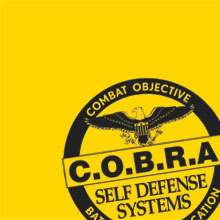
You love your kids and want to keep them safe, right? I know you mean well. But here are ten things you should STOP telling your children.
1. ALWAYS USE MANNERS AND DON’T BE RUDE
If you want your child to know that their safety comes first and foremost, then telling them they must not be rude is lying to them about what is sometimes required to navigate safely through life. The feelings of another person comes a very distant second to your child’s safety needs. Your kids should have permission to do whatever they have to in order to make themselves safe, even if that means telling an adult to go away, not letting someone touch them, revealing information they were told to keep “secret”, or yelling loudly if a stranger approaches them. Verbal assertion is therefore one of the pillars of self defense and an important lesson we must teach children. We understand the reticence of teaching children to talk tough and to be verbally assertive. We don’t want our kids to come across as impolite or rude. But at the end of the day, your child’s ability to verbally assert themselves can be enough to deter a would-be predator or to deny a school bully the emotional result they want. A child standing up for themselves is a learnt skill. We need to teach it to children.
2. YOU SHOULD ALWAYS HELP OTHERS
An adult should NEVER ask a child for help. There is absolutely no situation in which it is appropriate to do so. Lures like a lost dog have been used by predators for many years with success, and police have identified this as one of the top five lures used by predators. Sadly, this was the lure used on a schoolgirl in Australia, Sian, with tragic consequences. It is considered in the category of the ‘Helpless Lure’. This is the person who needs help carrying boxes to his car, or to find a lost dog, or is perhaps looking for a lost child. Please don’t tell your kids they should always help others. They shouldn’t.
3. THROWING TANTRUMS IS NAUGHTY
There is one time your child SHOULD throw a massive temper tantrum, and that’s when someone is trying to grab them! In this instance, kicking and screaming and thrashing around is literally the BEST thing your child can do. Just as it is effective against exasperated parents, the Temper Tantrum is effective self defense move for kids if they are grabbed or need to resisting being picked up, carried or thrown. Make sure your child knows they SHOULD throw a massive tantrum if they ever feel threatened, and they will not get in trouble for it at home if they do.
4. YOU ARE SAFE IN PUBLIC SPACES
A group of convicted rapist were interviewed and asked where they would look for a potential victim. The number one place they said they target victims is grocery store park lots. Number two is office parking lots/garages. Number three is public restrooms. Most abductions happen in public spaces; just look at the most recent series of abductions in Australia, where children were taken from places that include a campsite, playground, skate park and on a public footpath. In this case at least, safety is not necessarily in numbers. Rather than lying to your child about the level of safety they may or may not have in public, it is better to equip them with the knowledge of what to do if threatened in ANY space, be that public or private.
5. STRANGERS ARE DANGEROUS
The ‘Stranger Danger’ message is very effective in highlighting for children what to do if they are confronted by a stranger. But over 98% of sexual crimes committed against primary school age children is by people they think they can trust. Most predators are, in fact, those who the ‘Stranger Danger’ message tells them are safe, like family members, family friends and sporting coaches. While ‘Stranger Danger’ is still a valid message in some settings, it is far more effective to teach our kids to think critically, make smart choices and to avoid predators. We suggest that you educate your child with a more complex message about recognizing dangerous situations rather than people.
6. TAKE A PHONE FOR SAFETY
Parents, if you think having your phone provides a level of safety for your child, you’re wrong. Most parents think that having giving their child a smartphone means they can call for help if needed. But did you know the average response time for police in the United States is 11 minutes? This means that, even if your child does see an attack coming and has time to pull out their phone to make a 911 emergency call, they have at least 11 minutes alone with the attacker before help arrives. Smartphones are smart, but they aren’t smart enough. They can’t predict an attack, and apart from being an implement you can hit with, a phone will do little to help a child if a predator chooses him or her as his victim. Don’t let your child rely on a smartphone for safety, but instead empower them with essential self defense knowledge and skills that are effective immediately, not in 11 minutes.
7. YOU’RE SAFE ONLINE IF YOU DON’T GIVE YOUR DETAILS
Online safety is one of the biggest issues we face in protecting our children. More than 1 in 4 minors between the ages of 11 and 16 say they are in communication with people they first met online, unconnected with their offline social networks. Sadly, sex offenders are reaching out to children through social media platforms and coercing them into sharing inappropriate or naked pictures of themselves, which is secretly captured and shared in the darkest corners of the internet.
8. KEEP SECRETS
One of the most important things we recommend for families is a “no secrets” policy. You will never hear us say to our kids, “don’t tell”. Teach your children that, if anybody ever asks them to keep a secret, they should tell mom or dad right away. Secrets rarely bode well for innocent children and have forever harbored crimes and atrocities against kids from predators threatening retribution if kids ever “tell”.
9. YOU SHOULD “GIVE AUNT ALICE A HUG!”
Parents are constantly telling their children to give Aunt Alice a kiss, or hug Uncle David, or shake hands with the neighbor. If your child does not feel comfortable undertaking physical touch with an adult, please don’t force them to do so. Even if you think you can trust that adult, your child is entitled to have boundaries and to listen to their own intuition in regard to safe touch. We suggest you let your kids enforce boundaries with anybody, even family, even friends. It is not impolite; it is their right and an important personal liberty that can serve them well if said Uncle, or neighbor, or family friend DOES ever attempt to touch them inappropriately. Sadly, it happens. And you probably won’t know that it is.
10. MIND YOUR OWN BUSINESS
It is widely known in the self defense community that 90% of violent encounters can be avoided by confident body language, situational awareness or positive action to avoid or run away from incidents. The old adage, “mind your own business” is, in fact, contrary to the fundamental principle of self defense, which is about building habits which help you de-escalate confrontation or avoid it altogether. Knowing the who, what, when, where and why of your surroundings is absolutely key to this. It will mean your child notices the van following them on the street; your child sees the man approaching with a knife; or maybe they hear the front door open when they are home alone. If an incident does occur, your child also knows where they are if they need to call police, can say what brand of shirt the perpetrator was wearing or can tell the police about the tattoo on the back of the naughty-man’s neck. It also decreases their chances of even being targeted by a perpetrator in the first place, as predators target weak, non-confident and vulnerable looking children. Teach your child about situational awareness at all times and to be forthright in the world.
Like and share to help all parents around the world start empowering their children with these messages of self defense, safety and strength! Because one child is too many.

